79 Potassium Rich Foods, Fruits & Vegetables to Include in Your Diet
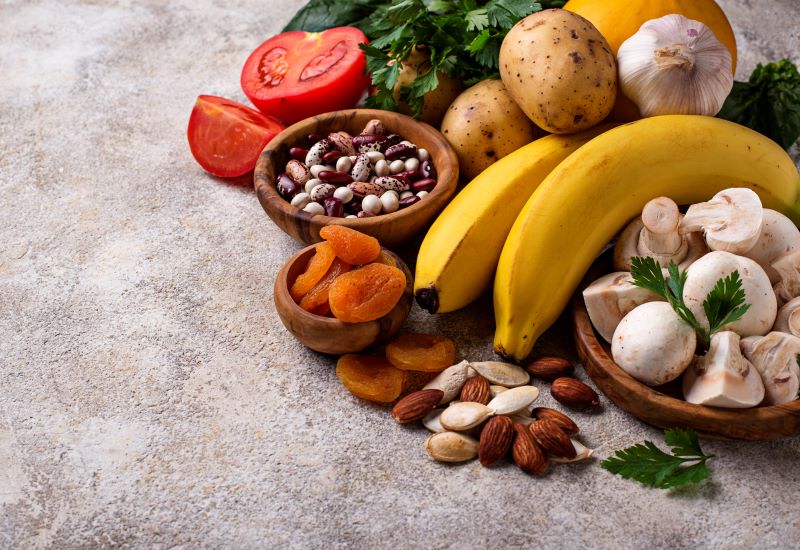
There is nothing more important for the body than potassium. This element plays a part in muscle contraction, nerve transmission, and fluid balance. Incorporating potassium-rich foods into meals will not only bring blood pressure under control but also foster cardiovascular health and overall wellness.
Hence, explore the significance of this component and see how you can integrate it into your dishes to become healthier and more energetic.

Table of Contents

What is Potassium?
Potassium is an essential mineral and electrolyte that helps keep many body parts working properly. It assists in healthy muscle contractions, nerve transmissions, maintaining fluid balance, and controlling blood pressure.
Sodium needs potassium within cells and organs to work right. Still, sodium can also cause this imbalance outside them, causing high BP or heart problems when not managed accordingly. Therefore, we must take enough amounts for all these functions to be carried out effectively; failure may result in ill health.
What are the Sources of Potassium?
Because there are many foods containing potassium, naturally, one does not have difficulties adding them to their meals daily. Such include fruits like bananas, among others such as oranges, while avocados rank highly in terms of richness with this element besides providing other vital nutrients plus antioxidants. Similarly, vegetables like spinach and sweet potatoes, together with tomatoes, can be considered good sources for getting enough amounts of potassium content into our bodies at any given time.
It should be noted, however, that legumes, nuts, seeds, and dairy products still play a significant role in meeting one’s daily requirement for this mineral category. For those who prefer animal-based alternatives, fish and poultry lean meats are also considered rich sources, but generally speaking, a balanced diet full of fruits, veggies, whole grain foods, etc., contains a wide variety.
Top 79 Food Items High in Potassium
Plunge into potassium-rich foods where each morsel promises to rejuvenate your body systems and enhance your health. With 79 sumptuous alternatives waiting to be tried out, take a journey that will change how you think about food with nourishment from within
List of Potassium Rich Vegetables
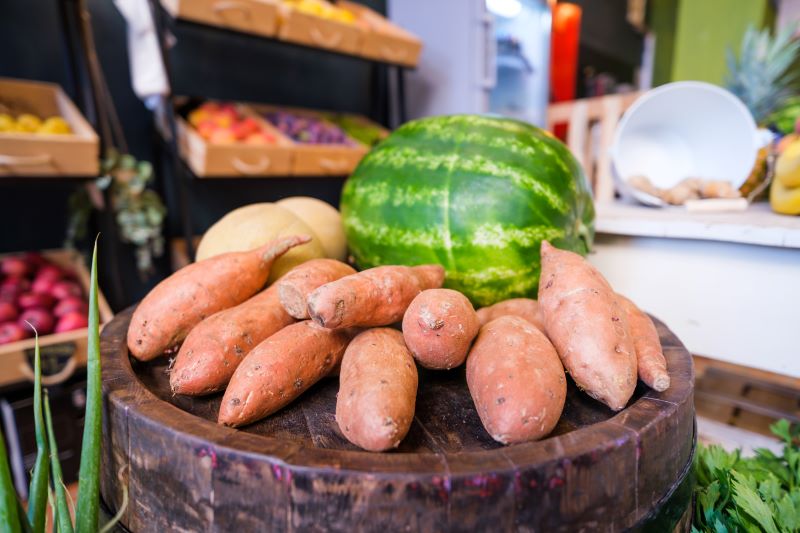
These colourful vegetables packed with flavours will tickle your palate as they nourish you internally. Add this amazing list of vegetables to enhance potassium levels in your body.
SNo. |
Vegetables | Potassium Content (Per 100 grams) |
| 1 | Spinach | 558 mg |
| 2 | Sweet potatoes | 337 mg |
| 3 | Potatoes | 421 mg |
| 4 | Beet greens | 909 mg |
| 5 | Brussels sprouts | 389 mg |
| 6 | Swiss chard | 379 mg |
| 7 | Tomato | 237 mg |
| 8 | Broccoli | 316 mg |
| 9 | Kale | 228 mg |
List of Fruits Rich in Potassium
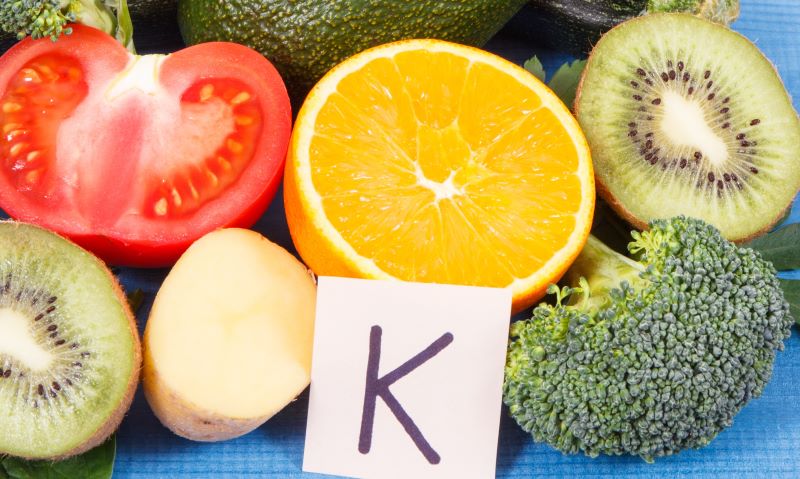
Satisfy your sweet tooth by consuming carefully selected fruits rich in this vital mineral for better health.
SNo. |
Fruits | Potassium Content (Per 100 grams) |
| 10 | Bananas | 358 mg |
| 11 | Oranges | 181 mg |
| 12 | Avocados | 485 mg |
| 13 | Cantaloupe | 267 mg |
| 14 | Apricots | 259 mg |
| 15 | Papaya | 182 mg |
| 16 | Kiwi | 312 mg |
| 17 | Mango | 168 mg |
| 18 | Pomegranate | 236 mg |
| 19 | Dates | 696 mg |
| 20 | Figs | 232 mg |
| 21 | Prunes | 732 mg |
| 22 | Raisins | 749 mg |
| 23 | Guava | 417 mg |
| 24 | Plantains | 499 mg |
| 25 | Pineapple | 109 mg |
| 26 | Passion fruit | 348 mg |
| 27 | Jackfruit | 303 mg |
| 28 | Persimmon | 161 mg |
| 29 | Tamarind | 628 mg |
| 30 | Watermelon | 112 mg |
| 31 | Lychee | 171 mg |
| 32 | Blackberries | 162 mg |
| 33 | Blueberries | 77 mg |
| 34 | Strawberries | 153 mg |
| 35 | Raspberries | 151 mg |
| 36 | Cranberries | 85 mg |
| 37 | Grapes | 191 mg |
| 38 | Figs (dried) | 680 mg |
| 39 | Peaches | 190 mg |
List of Cereals and Dairy Products Containing Potassium
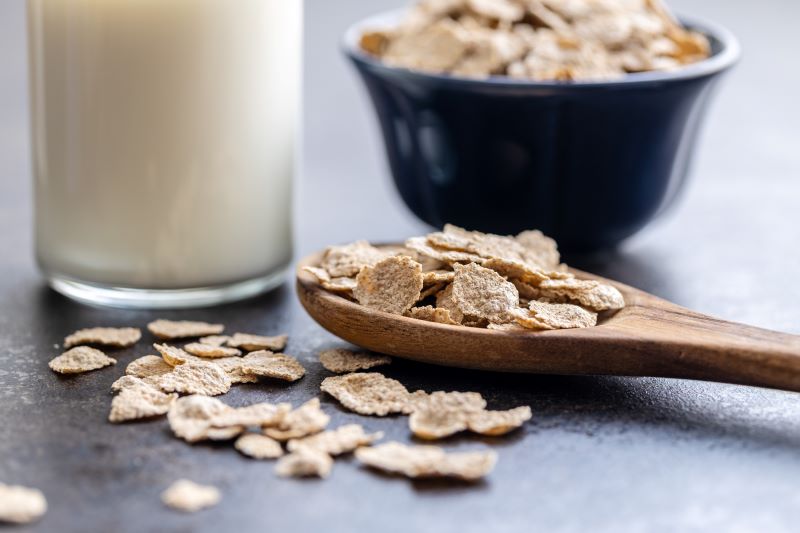
Opt for one of these breakfast or snack options full of potassium to ensure you have balanced energy throughout the day.
SNo. |
Cereals and Dairy Products | Potassium Content (Per 250 grams) |
| 40 | Bran flakes | 2500 mg |
| 41 | Low-fat yogurt | 950 mg |
| 42 | Milk (1 cup) | 915 mg |
| 43 | Oatmeal (1 cup) | 325 mg |
| 44 | Whole grain bread | 575 mg |
| 45 | Brown rice | 280 mg |
| 46 | Quinoa | 520 mg |
| 47 | Barley | 490 mg |
| 48 | Greek yoghurt | 720 mg |
| 49 | Cheese | 680 mg |
| 50 | Cottage cheese | 550 mg |
| 51 | Almond milk | 500 mg |
List of Seeds and Nuts Rich in Potassium
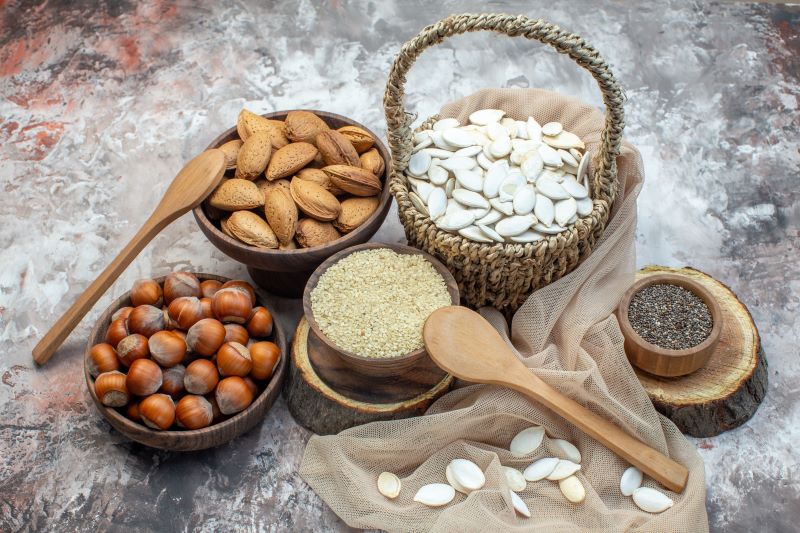
Snack intelligently on these seeds and nuts, which are dense in nutrients, thereby providing sustained energy through delicious means that contain potassium.
SNo. |
Seeds and Nuts | Potassium Content (Per 100 grams) |
| 52 | Sunflower seeds | 645 mg |
| 53 | Pistachios | 1025 mg |
| 54 | Almonds | 733 mg |
| 55 | Pumpkin seeds | 919 mg |
| 56 | Cashews | 660 mg |
| 57 | Pine nuts | 597 mg |
| 58 | Hazelnuts (filberts) | 680 mg |
| 59 | Peanuts | 705 mg |
| 60 | Flaxseeds | 813 mg |
| 61 | Chia seeds | 407 mg |
| 62 | Sesame seeds | 975 mg |
| 63 | Hemp seeds | 860 mg |
| 64 | Walnuts | 441 mg |
List of Animal and Seafood High in Potassium
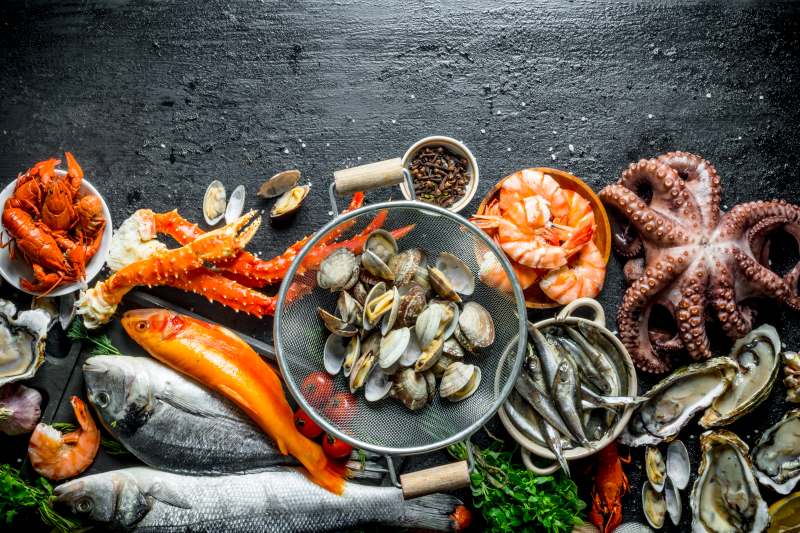
Broaden the variety within which animal sources can be used while adding richness to the diet by including these nutrient-filled foods.
SNo. |
Animal and Seafood | Potassium Content (Per 100 grams) |
| 65 | Chicken breast | 256 mg |
| 66 | Turkey breast | 328 mg |
| 67 | Salmon | 628 mg |
| 68 | Tuna | 486 mg |
| 69 | Shrimp | 295 mg |
| 70 | Crab | 329 mg |
| 71 | Lobster | 353 mg |
| 72 | Mussels | 345 mg |
| 73 | Clams | 267 mg |
| 74 | Beef | 256 mg |
| 75 | Pork | 335 mg |
| 76 | Lamb | 350 mg |
| 77 | Sardines | 397 mg |
| 78 | Anchovies | 392 mg |
| 79 | Oysters | 244 mg |
How Much Potassium Should You Intake?
According to the National Institutes of Health (NIH), understanding the recommended daily potassium intake is vital for overall health. Let's explore NIH's guidelines for potassium consumption across different age groups and life stages.
Age Group |
Recommended Potassium Intake (milligrams per day) |
| Infants 0-6 months | 400 mg |
| Infants 7-12 months | 860 mg |
| Children 1-3 years | 2,000 mg |
| Children 4-8 years | 2,300 mg |
| Children 9-13 years | 2,500 mg |
| Male Teens 14-18 years | 3,000 mg |
| Female Teens 14-18 years | 2,300 mg |
| Male Adults 19+ years | 3,400 mg |
| Female Adults 19+ years | 2,600 mg |
| Pregnant Teens | 2,600 mg |
| Pregnant Adults | 2,900 mg |
| Lactating Teens | 2,800 mg |
| Lactating Adults | 2,800 mg |
| Adults 50+ years | 2,600-3,400 mg |
Check Other Important Health Metrics Now
Health Benefits of Including Potassium Rich Foods in Your Diet
Incorporating potassium into your diet offers various health benefits. From controlling blood pressure to supporting muscle and nerve activities, here are a few benefits of including more potassium in your diet.
- Controls Blood Pressure: Potassium nullifies the effects of sodium and thus helps to reduce high blood pressure, which can lead to heart attack or stroke.
- Supports Muscle Activities: Enough potassium is important for muscle work as it contracts and relaxes well, improving physical performance and preventing muscle cramping.
- Balance Liquids: By regulating liquids within the body, potassium ensures that a person stays hydrated constantly, preventing conditions such as swelling and drying up.
- Speeds Up Nerve Communication: It is necessary during nerve transmission since it enhances the quick sending of messages from one part of our bodies to another.
- Better Bone Health: Some studies have indicated that high intake levels may increase bone density, reducing the chances of osteoporosis.
- Helps Digestion: These foods ensure smoothness in bowel movement by relaxing muscles along the alimentary canal.
- Promotes Heart Functions: The heart needs sufficient blood always to beat normally; otherwise, it will have an arrhythmia, i.e., abnormal beats, or even stop altogether.
Different Ways to Include Potassium Rich Foods in Your Diet
Different cooking methods and exciting recipes should be employed to make them tasty and easy to include in our everyday meals, which is necessary if we want a well-balanced diet.
- Salads With Leafy Greens: When making lively salads, combine green vegetables like kale or spinach with tomatoes, which are a rich source of potassium.
- Smoothies or Toppings: Mix bananas with high potassium levels with oranges during breakfast smoothie preparation or as yoghurt/oatmeal toppings.
- Snacks With Nuts And Seeds: For a quick pick-me-up throughout the day, snack on nuts such as almonds and sunflower seeds, which provide lots of easy-to-get potassium.
- Meals That Satisfy Using Whole Grains: Base filling salads off quinoa among other whole grains; alternatively, cook them as side accompaniments for main dinners.
- Dairy Products Rich In Creaminess And Nutrients: Add creamy texture and nutrition using yoghurt or milk in smoothies and baked goods soups.
What are the Symptoms of Potassium Deficiency?
Potassium deficiency, also known as hypokalemia, can result in various diseases because potassium is essential to the body. Awareness of the signs of potassium deficiency is crucial for one’s general health and welfare.
What are the Health Risks of Not Getting Enough Potassium?
Several health risks and complications can result from a lack of potassium. You should be aware of these dangers to prioritise potassium-rich foods in your diet.
- High Blood Pressure: The ability of the human body to control blood pressure may be affected by low potassium levels, which may cause hypertension and other heart problems.
- Weak Muscles: Without enough potassium, muscles tend to become weak and cramped thus limiting physical performance as well as daily activities.
- Fatigue and Weakness: Ingesting inadequate amounts of potassium leads to tiredness all over the body, general weakness and low energy levels.
- Heart Palpitations: It is responsible for ensuring that the heart beats regularly at its normal pace; when levels are low, this causes arrhythmia or irregular beats, which can be fatal.
- Increased Risk Of Stroke: Regularisation of blood pressure is one way through which chronic deficiencies are linked with high chances for stroke since this affects cardiovascular functions, too.
- Bone Problems: Taking less amount than required may result in reduced bone density, making them weak and eventually susceptible to fractures even without significant trauma.
What are the Side Effects of Excessive Potassium Intake?
Knowing the potential adverse effects of too much potassium in the body is essential in maintaining a healthy diet and overall wellness.
- Hyperkalemia: Abnormally high levels of blood potassium may trigger a condition termed hyperkalemia. It disrupts regular heartbeats, causing palpitations or arrhythmias.
- Digestive System Disturbance: Consuming excessive amounts of dietary salt substitutes containing potassium may cause gastrointestinal symptoms like throwing up, stomach pain as well as diarrhoea.
- Muscle Weakness: Elevated serum potassium levels due to excessive intake; such an individual could become weak in their muscles or paralysed completely.
- Tingling/numbness: Too much consumption may lead to feelings akin to pricking pins beneath one’s skin, especially around the region of his/her hands and feet, where sensitivity tends to be higher.
- Renal Impairment: A person’s kidneys will likely suffer damage over time because they work harder to filter out excess amounts than what our bodies need.
Should You Take a Potassium Supplement?
Whether one should take a potassium supplement depends on circumstances and health requirements. Often, it is best to get nutrients from whole food items as they provide a variety of balanced nutrients that are less likely to cause over-consumption.
Nevertheless, there are times when diet alone cannot suffice or when certain medical conditions demand more potassium; in such cases, supplementation becomes necessary.
Therefore, it is essential to talk to your doctor before starting any new supplements and ensure they’re safe for you, given what you are going through health-wise. Otherwise, this could lead to an imbalance in the body, which may have severe consequences for somebody’s well-being.
Nonetheless, continuous monitoring of one’s potassium levels must be done regularly to prevent and detect possible side effects or complications arising from excessive intake.
To sum up, including potassium-rich foods in our meals is essential for health reasons. The many benefits of these foods cannot be overstated because they help us function properly. Our bodies need potassium to perform various functions, such as regulating muscle contractions and maintaining healthy blood pressure levels.
To achieve the above goals, let’s appreciate every bit of those nourishing elements found abundantly around us while striving towards higher fitness levels.
Protect What Matters - Explore Other Insurance Options














